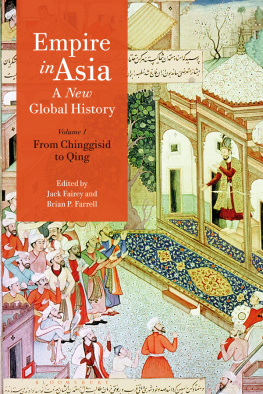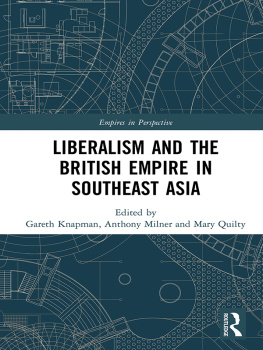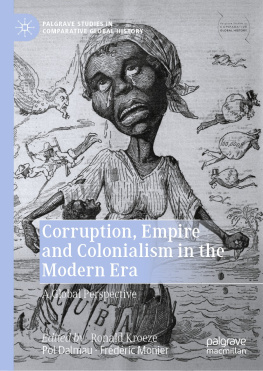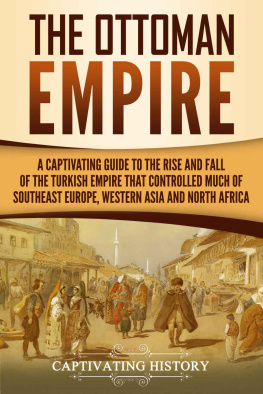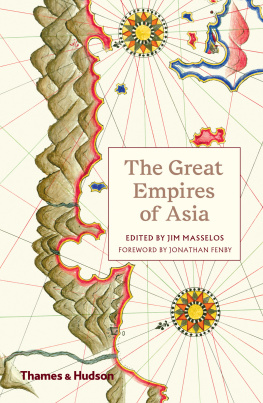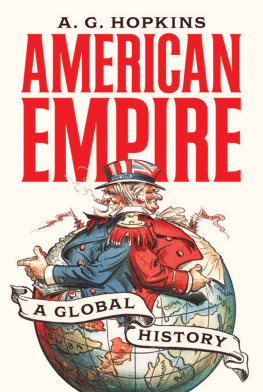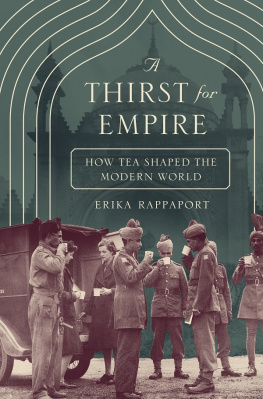Fairey - Empire in Asia: A New Global History
Here you can read online Fairey - Empire in Asia: A New Global History full text of the book (entire story) in english for free. Download pdf and epub, get meaning, cover and reviews about this ebook. publisher: Bloomsbury UK, genre: Politics. Description of the work, (preface) as well as reviews are available. Best literature library LitArk.com created for fans of good reading and offers a wide selection of genres:
Romance novel
Science fiction
Adventure
Detective
Science
History
Home and family
Prose
Art
Politics
Computer
Non-fiction
Religion
Business
Children
Humor
Choose a favorite category and find really read worthwhile books. Enjoy immersion in the world of imagination, feel the emotions of the characters or learn something new for yourself, make an fascinating discovery.
Empire in Asia: A New Global History: summary, description and annotation
We offer to read an annotation, description, summary or preface (depends on what the author of the book "Empire in Asia: A New Global History" wrote himself). If you haven't found the necessary information about the book — write in the comments, we will try to find it.
Fairey: author's other books
Who wrote Empire in Asia: A New Global History? Find out the surname, the name of the author of the book and a list of all author's works by series.
Empire in Asia: A New Global History — read online for free the complete book (whole text) full work
Below is the text of the book, divided by pages. System saving the place of the last page read, allows you to conveniently read the book "Empire in Asia: A New Global History" online for free, without having to search again every time where you left off. Put a bookmark, and you can go to the page where you finished reading at any time.
Font size:
Interval:
Bookmark:

Empire in Asia
Empire in Asia: A New Global History
Volume One From Chinggisid to Qing
Edited by
Jack Fairey and Brian P. Farrell

Contents
Jack Fairey and Brian P. Farrell
Jack Fairey and Brian P. Farrell
Florence Hodous
Jinping Wang
Frederik Vermote
Jack Fairey
Murari Kumar Jha
Paul W. Werth
Bruce M. Lockhart
Sher Banu Khan
Anthony Rendell Disney
Peter Borschberg
These volumes emerged from a research project based in the Department of History, National University of Singapore, with which they also share a title. The investigators, editors, authors, and project members note with gratitude the support provided by the Singapore Ministry of Education through a research grant from the MOE Academic Research Fund, Tier 2, without which this work would not have been possible. Grateful thanks also to the Faculty of Arts and Social Sciences, as well as the Department, for understanding and support. Claire Lipscomb and Emma Goode from Bloomsbury were more patient than we deserved and very supportive, for which our thanks. Among the authors, special mention must go to Thomas Dubois for doing so much to launch the entire project in the first place. Miriam Kaminishi and Ishizu Tomoyuki made timely and welcome contributions to the project as a whole. Most welcome and effective research assistance was provided by Michelle Djong, Daniel Lee, Aloysius Ng, Sandeep Singh, Amelia Tan, Wilfred Teo, and Jennifer Yip. Last but not least, the many students who over the years have taken our course HY2245 History of Empires, Colonies and Imperialism have our gratitude for inspiring the whole idea in the first place.
Personal and Place Names
Personal names are generally given in the forms that will be most familiar to readers (e.g., Peter the Great instead of Ptr Velikii). A few notable exceptions have been made, however, to bring anglicized names closer to their original form: for example, Chinggis for Genghis, Qubilai for Kubilai, and Tmr for Tamerlane. Similarly, place-names are generally given in their modern, official form, with a few exceptions made for places that are better known under their historic names: therefore, Cochin and Banquibazar rather than Kochi and Ichapore (but Melaka rather than Malacca). Batavia, Bombay, Calcutta, and Madras have also been used occasionally to refer to the cities of Jakarta, Mumbai, Kolkata, and Chennai, as the historic names also refer to the larger Dutch and British colonies and presidencies of which they were the capitals. For clarity, the modern official name will be given once in parenthesis upon the first use of such historic names.
Transliteration and Romanization
Non-English words are italicized upon first use only. Words such as jihad, khan, and Sharia that have entered regular English usage have not been italicized, nor has any attempt been made to transliterate them in any systematic fashion (so jihad rather than jihd). Words and names from languages written in non-Latin scripts are rendered according to the following systems.
Arabic: as per the system of the International Journal of Middle Eastern Studies
Chinese: as per the Pinyin system of romanization, without the diacritics showing tones
Greek: as per the American Library AssociationLibrary of Congress (ALA-LC)
Japanese: as per the Revised Hepburn system of romanization
Korean: as per the McCune-Reischauer system of romanization
Manchu: as per the Mllendorff transliteration system
Mongolian: as per the system of Nicholas Poppes Grammar of Written Mongolian, modified by replacing , , and with ch, sh, and gh
Ottoman Turkish: as per modern Turkish orthography, except that final unvoiced consonants are left voiced (e.g., Ahmed not Ahmet and Mehmed not Mehmet)
Persian: as per the system of the International Journal of Middle Eastern Studies
Russian: as per the American Library AssociationLibrary of Congress (ALA-LC), slightly modified by removing all diacritic marks (e, ii, ts, iu, and ia for , i, ts, iu, and ia)
Sanskrit: as per the International Alphabet of Sanskrit Transliteration (IAST)
Peter Borschberg teaches history at the National University of Singapore. He specializes in Europe-Asian interactions in the early-modern period, mainly with a geographic focus on Southeast Asia. He is the author of several studies including The Singapore and Melaka Straits: Violence, Security and Diplomacy in the Seventeenth Century (2011), as well as Hugo Grotius, the Portuguese and Free Trade in the East Indies (2012).
Anthony Rendell Disney, MA (Oxon.), PhD (Harvard), is primarily a historian of the Portuguese empire in maritime Asia in the sixteenth and seventeenth centuries, about which he has written extensively. His works include Twilight of the Pepper Empire: Portuguese Trade in Southwest India in the Early Seventeenth Century (1978; 2nd edn 2010); A History of Portugal and of the Portuguese Empire: From Beginnings to 1807 (two volumes, 2009); The Portuguese in India and Other Studies, 15001700 (2009); and numerous articles, papers, and other shorter works. He has taught at Melbourne and La Trobe Universities in Australia and has been a scholar emeritus at La Trobe since 2010. Anthony has also been a member of the International Seminar on Indo-Portuguese History since its foundation in 1978. Currently he is writing a biography of Dom Miguel de Noronha, fourth Count of Linhares, who was viceroy at Goa between 1629 and 1635.
Jack Faireys research work deals primarily with the history of the Mediterranean and Eastern Orthodox Christendom, with a particular interest in empires, religion, and diplomacy. He was Ted & Elaine Athanassiades Post-Doctoral Research Fellow at the Program in Hellenic Studies at Princeton in 20052006, and has previously taught European, Ottoman, and Mediterranean history at the National University of Singapore, and before that at Queens University and York University in Canada. He is the coeditor of Volume One of Empire in Asia. His most recent publication, The Great Powers and Orthodox Christendom: The Crisis over the Eastern Church in the Era of the Crimean War (2015), examines the role of the Orthodox Church as a locus for competing imperial agendas in the mid-nineteenth-century Ottoman Empire. The monograph shows how competition among the British, Russian, French, Austrian, and Ottoman governments over religious protectorates and clerical privileges contributed first to the outbreak of the Crimean War (185356) and then to secularizing reforms in the Ottoman Empire. His other publications have dealt with the impact of religion and imperial ideologies on group identity in the Balkans, as well as with the intersections of British, French, Russian, Austrian, and Ottoman imperialism in the eastern Mediterranean.
Brian P. Farrell is professor of history at the National University of Singapore, where he has been teaching since 1993. His research and teaching interests focus on the military history of the British Empire, the Western military experience in Asia, and the modern history of Empire in Asia. He is the author of The Defence and Fall of Singapore 19401942 (2005) and The Basis and Making of British Grand Strategy 19401943: Was There a Plan?
Font size:
Interval:
Bookmark:
Similar books «Empire in Asia: A New Global History»
Look at similar books to Empire in Asia: A New Global History. We have selected literature similar in name and meaning in the hope of providing readers with more options to find new, interesting, not yet read works.
Discussion, reviews of the book Empire in Asia: A New Global History and just readers' own opinions. Leave your comments, write what you think about the work, its meaning or the main characters. Specify what exactly you liked and what you didn't like, and why you think so.

